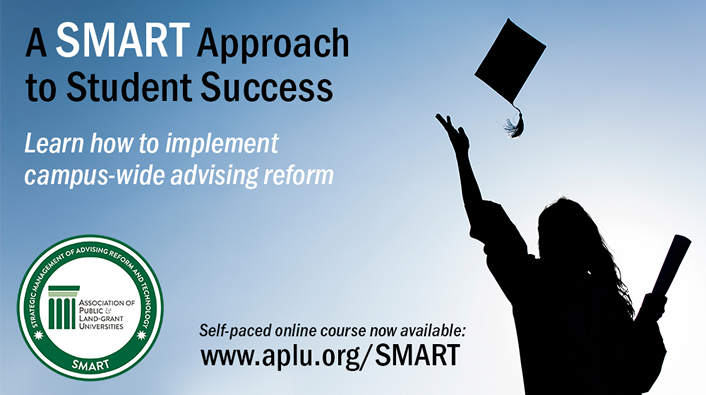
Last year, as program manager for the Personalized Learning Consortium of the Association of Public and Land-grant Universities (APLU), and with a video production crew on hand, I visited five colleges and universities. These institutions, all five of them, successfully increased student success through the implementation of campus-wide, proactive advising systems, supported by the strategic use of technology. I made these trips to see first-hand how each institution had transformed their advising policies and practices and capture it on video. My goal: to identify key lessons that could be broadly shared.
While many colleges and universities are aware of the need for and potential benefits of campus-wide advising reform, a lot of leaders are less sure about how to start. It’s understandable because the process of a change like this can be complicated, costly, and time-consuming. APLU recognized that higher ed leaders would benefit from the knowledge and experiences of peer institutions that have been successful; we set out to develop a self-paced online course [http://www.aplu.org/smart] that would replicate a site visit to any one of these leading institutions.
The APLU team visited Austin Community College, Colorado State University, Georgia State University, Middle Tennessee State University, and Whatcom Community College. We conducted approximately 100 hours of interviews with presidents, provosts, vice provosts for student success, vice presidents of information technology, advising personnel, and faculty at each campus to identify how they approached advising reform.
Effective Transitions to Campus-wide Proactive Advising
On every campus, the sense of collaboration around student success was palpable. We learned that effective advising reform requires unwavering executive and project-level leadership, includes strong mechanisms for cross-campus collaboration and communication across academic and student affairs, tailors reform efforts to specific campus contexts, and keeps all stakeholders informed about the expected returns on investments in student success. Successfully implemented proactive advising systems — far more than a single technology implementation — change administrative structures, reform policies and practices, retrain personnel, and use data analytics to support students.
We noticed that as a central aspect of their work, each institution made a strategic effort to weave a web between the various systems and support services available to students. The result was seamless support for students’ paths toward a degree. We also discovered these common successful practices:
- Identify student success as a central focus of the institution and clearly define the role that each member of the campus community plays in that mission
- Establish mechanisms of collaboration between academic affairs, student affairs, institutional research, and information technology
- Identify areas for change and improvement by taking a student-centered approach
- Implement the use of data systems and new technologies to identify where students are falling off track so that advisors, faculty, and other representatives of the university with whom the student interacts are able to reach out to the student before warning signs become real problems
- Invest in advisors and faculty professional development and engagement
- Develop clear communication strategies to engage the entire campus in tracking progress toward change
The Course: A SMART Approach to Student Success
This week APLU launched the six lesson, self-paced online course, A SMART Approach to Student Success: Strategic Management of Advising Reform and Technology [http://www.aplu.org/smart]. The course includes curated video content (collected during those five site visits) addressing a diversity of approaches, challenges, and successes through interviews with executive and project level leadership from the five institutions. Each lesson also includes resources developed by experts in the field that highlight the current landscape of research around implementation strategies as well as practical activities, templates, and worksheets to guide campus teams in planning, implementation, evaluation, and communication. Already, institutions are using the course to lead team meetings about advising reform, facilitate discussions with leadership about student success, and develop plans for change at their institutions.
Working Together to Drive Student Success
We hope this project will help expand the community of institutions engaging in campus-wide advising reform. It’s important to come together as a community to drive student success. Because together we can and will increase degree attainment for today’s students and build the workforce our nation needs for the next generation.
Lynn Brabender is the program manager for the Personalized Learning Consortium of the Association of Public and Land-grant Universities.
